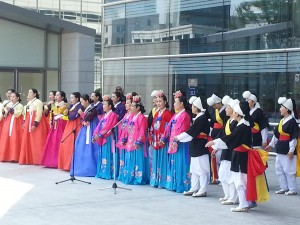The demonstration “Reformulation-based query answering in RDF: alternatives and performance” by Damian Bursztyn, François Goasdoué and Ioana Manolescu has been accepted for publication at VLDB 2015.
Permanent link to this article: https://team.inria.fr/oak/2015/06/01/vldb-2015-reformulation-based-query-answering-in-rdf-alternatives-and-performance/
Jun 01
VLDB 2015: “EFQ: Why-Not Answer Polynomials in Action”
The demonstration “EFQ: Why-Not Answer Polynomials in Action” by Nicole Bidoit, Melanie Herschel and Katerina Tzompanaki has been accepted for publication at VLDB 2015.
Permanent link to this article: https://team.inria.fr/oak/2015/06/01/vldb-2015-efq-why-not-answer-polynomials-in-action/
Jun 01
Google Computational Research Journalism Award
A Google Computational Research Journalism Award has been obtained for
our proposal “Event Thread Extraction for Viewpoint Analysis”
with Xavier Tannier and Fréderic Vernier (LIMSI) and Les Décodeurs (Le Monde).
Permanent link to this article: https://team.inria.fr/oak/2015/06/01/google-computational-research-journalism-award/
Permanent link to this article: https://team.inria.fr/oak/2015/05/13/michael-thomazo-ranked-1st-in-inria-saclay-cr-competition/
May 04
OAK at ICDE 2015
Stamatis and Ioana have attended ICDE 2015 in Korea!
We presented the CliqueSquare paper and demo, as well as an ICDE tutorial, and a paper and a keynote in the DESWeb workshop.
Here are some photos of Stamatis next to his poster:
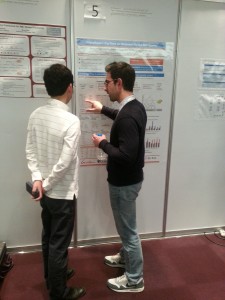
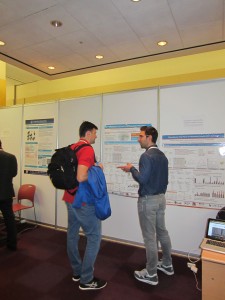 And some photos from the presentation (thanks Zoi!)
And some photos from the presentation (thanks Zoi!)
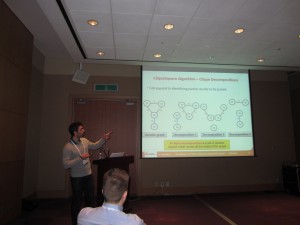
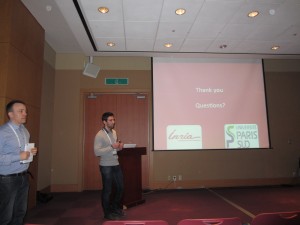 Various interesting things were happening in and around the conference area, here is just a sample: a traditional music costume show we could see at a break!
Various interesting things were happening in and around the conference area, here is just a sample: a traditional music costume show we could see at a break!
Permanent link to this article: https://team.inria.fr/oak/2015/05/04/oak-at-icde-2015/
Apr 21
DL 2015: “Efficient Query Answering in DL-Lite through FOL Reformulation (Extended Abstract)”
“Efficient Query Answering in DL-Lite through FOL Reformulation (Extended Abstract)” by Damian Bursztyn, François Goasdoué and Ioana Manolescu has been accepted at Description Logics (DL) 2015.
Permanent link to this article: https://team.inria.fr/oak/2015/04/21/dl-2015-efficient-query-answering-in-dl-lite-through-fol-reformulation-extended-abstract/
Apr 15
BICOD 2015: “Query-Oriented Summarization of RDF Graphs”
“Query-Oriented Summarization of RDF Graphs” by Sejla Cebiric, François Goasdoué and Ioana Manolescu has been accepted as a “work in progress” paper at BICOD (formerly BNCOD) 2015.
Permanent link to this article: https://team.inria.fr/oak/2015/04/15/bicod-2015-query-oriented-summarization-of-rdf-graphs/
Apr 01
First LINKS-OAK joint workshop
When:Friday, April 3, from 10.00 to 15.45 (approximately)
Where:PCRI Building, room 445
PhD Student talks:
- Raphael Bonaque: Structured, Social and Semantic Search.
- Damian Bursztyn: Optimized reformulation query answering for RDF-S and/or DLLite-R.
- Radu Ciucanu: Learning Path Queries on Graph Databases.
- Paul Lagrée: A Network-Aware Approach for Searching As-You-Type and Personalizing Answers in Social Media.
- Katerina Tzompanaki: Why-Not questions: Polynomial explanations
- Stamatis Zampetakis: CliqueSquare: Flat Plans for Massively Parallel RDF Queries
Each PhD talk will last 30 minutes (20 minutes presentation + 10 minutes for Q/A).
MS student talks:
- Sejla Cebiric: Query-Driven Summarization of RDF Graphs
- Michele Linardi: Relational-to-RDF Schema Mapping
Each MS talk will last 15 minutes (10 minutes presentation + 5 minutes for Q/A)
Permanent link to this article: https://team.inria.fr/oak/2015/04/01/first-links-oak-joint-workshop/
Mar 27
Helena Galhardas: Speeding up information extraction programs – a holistic optimizer and a learning-based approach to rank documents
When:Friday, March 27, at 14.00
Where:PCRI Building, room 445
Who: Helena Galhardas, INESC-ID and IST/University of Lisbon
Title: Speeding up information extraction programs – a holistic optimizer and a learning-based approach to rank documents
Abstract:
A wealth of information produced by individuals and organisations is expressed in natural language text. Text lacks the explicit structure that is necessary to support rich querying and analysis. Information extraction systems are sophisticated software tools to discover structured information in natural language text. Unfortunately, information extraction is a challenging and time-consuming task.
In this talk, I will first present our proposal to optimize information extraction programs. It consists of a holistic approach that focuses on: (i) optimizing all key aspects of the information extraction process collectively and in a coordinated manner, rather than focusing on individual subtasks in isolation; (ii) accurately predicting the execution time, recall, and precision for each information extraction execution plan; and (iii) using these predictions to choose the best execution plan to execute a given information extraction program.
Then, I will briefly present a principled, learning-based approach for ranking documents according to their potential usefulness for an extraction task. Our online learning-to-rank methods exploit the information collected during extraction, as we process new documents and the fine-grained characteristics of the useful documents are revealed. Then, these methods decide when the ranking model should be updated, hence significantly improving the document ranking quality over time.
This is joint work with Gonçalo Simões, INESC-ID and IST/University of Lisbon, and Pablo Barrio and Luis Gravano from Columbia University, NY.
Permanent link to this article: https://team.inria.fr/oak/2015/03/27/helena-galhardas-speeding-up-information-extraction-programs-a-holistic-optimizer-and-a-learning-based-approach-to-rank-documents/
Mar 11
Cristina Sirangelo: Querying incomplete data
Who: Cristina Sirangelo, École Normale Supérieure de Cachan
Title: Querying incomplete data
Abstract:
Data is incomplete when it contains missing/unknown information, or more generally when it is only partially available, e.g. because of restrictions on data access.
Incompleteness is receiving a renewed interest as it is naturally generated in data interoperation, a very common framework for today’s data-centric applications. In this setting data is decentralized, needs to be integrated from several sources and exchanged between different applications. Incompleteness arises from the semantic and syntactic heterogeneity of different data sources.
Querying incomplete data is usually an expensive task. In this talk we survey on the state of the art and recent developments on the tractability of querying incomplete data, under different possible interpretations of incompleteness.
Permanent link to this article: https://team.inria.fr/oak/2015/03/11/cristina-sirangelo-querying-incomplete-data/


